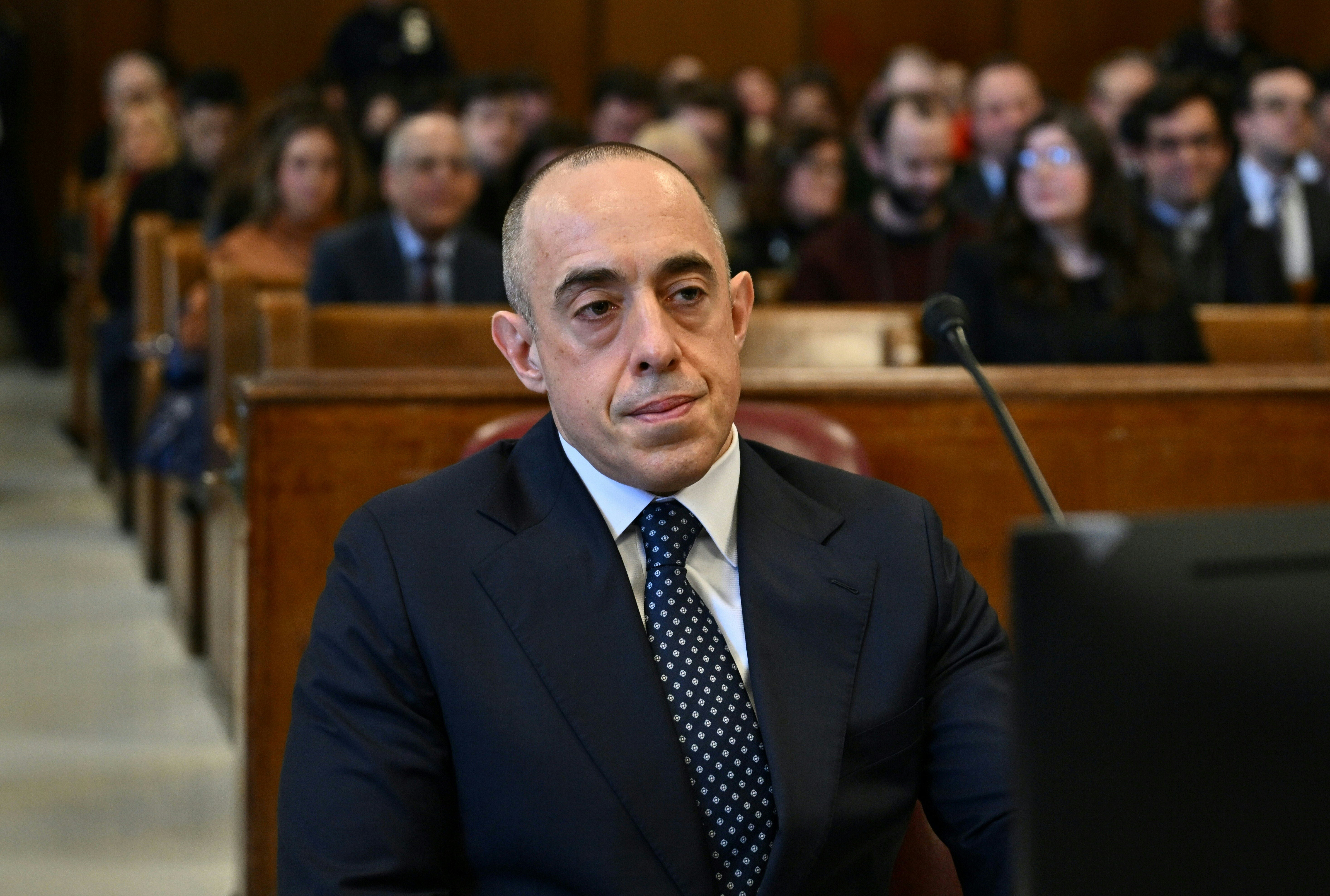Emil Bove, a former defense lawyer for President Donald Trump who is now a top official at the Department of Justice, told staff that he was willing to disregard court orders to advance the president’s mass deportation efforts, according to a whistleblower complaint.
The attorney who filed the complaint, Erez Reuvani, has since been fired. The letter was first reported by The New York Times.
Bove told government attorneys they should “consider telling the courts ‘f*** you’ and ignore any such order,” according to Reuvani’s account, which was sent to lawmakers and the department’s inspector general on Tuesday.
Other top department officials also appeared to be willing to stonewall judges or lie to achieve their goals, according to the report.
Bove, meanwhile, has been nominated by the president to sit on a federal appeals court. He is set to appear before the Senate Judiciary Committee on Wednesday.

Reuvani spent almost 15 years at the Justice Department until April, when he shared concerns in federal court that the administration had deported a man to El Salvador by mistake. Just one day later, he was placed on administrative leave, and he was subsequently fired.
A White House spokesperson told The Times that Bove is “an incredibly talented legal mind and a staunch defender of the U.S. Constitution who will make an excellent circuit court judge.”
Todd Blanche, Bove’s boss, wrote on X that the “article describes falsehoods purportedly made by a disgruntled former employee and then leaked to the press in violation of ethical obligations.”
“The claims about Department of Justice leadership and the Principal Associate Deputy Attorney General are utterly false,” he added.
The letter indicates that there are emails, texts, and phone records to back up Reuvani’s account, which was filed by Dana Gold and Andrea Meza, Reuvani’s attorneys at the Government Accountability Project. It states that he was recently promoted and had defended the immigration policies of the first Trump White House.
According to Reuvani’s account, Justice Department officials were mulling plans earlier this year to “resist court orders that would impede potentially illegal efforts to deport noncitizens, and further became aware of the details to execute those plans.”
Top Justice Department and White House officials attempted to defy court orders “through lack of candor, deliberate delay and disinformation,” according to the letter.
“Discouraging clients from engaging in illegal conduct is an important part of the role of a lawyer,” the letter states. “Reuveni tried to do so and was thwarted, threatened, fired and publicly disparaged for both doing his job and telling the truth to the court.”
During a meeting on March 14, Bove told staff that Trump was preparing to invoke the Alien Enemies Act to fly a number of immigrants out of the country that weekend.
Bove “stressed to all in attendance that the planes needed to take off no matter what,” the letter states.
He then noted “the possibility that a court order would enjoin those removals before they could be effectuated.”
“Bove stated that DOJ would need to consider telling the courts ‘f*** you’ and ignore any such order,” according to the account.
Reuveni “perceived that others in the room looked stunned, and he observed awkward, nervous glances among people in the room,” according to the letter. “Silence overtook the room.”
He left the meeting with the understanding that DOJ would tell Homeland Security to follow court orders, and to his knowledge, no one in DOJ leadership or within the administration had ever suggested that the government would “blatantly ignore them,” according to the letter.
Hundreds of Justice Department attorneys have left the department in the wake of Trump’s inauguration.

The account claims that one of three illegal orders was made in the case of Kilmar Abrego Garcia, a Salvadoran immigrant who was mistakenly deported to a brutal prison in his home country despite an immigration court order blocking his removal.
He was on one of the planes that left the United States on March 15.
During a court hearing over legal challenges to Abrego Garcia’s removal, Reuveni had agreed with an earlier admission from government attorneys that Abrego Garcia had been removed by mistake.
One of Reuvani’s supervisors, Drew Ensign, asked him why he had not argued that Abrego Garcia was a terrorist, according to his account. Ensign said that his comments “were prompted by the White House,” the letter states.
Reuvani said during the phone call that there was no evidence, and stressed that calling someone a terrorist doesn’t remove their right to due process. He was told the following day that he should sign an appeal brief, which included the claim. Reuvani pushed back, and he was subsequently placed on administrative leave and later fired.
Abrego Garcia has separately been criminally charged with smuggling immigrants, three months after he was removed from the country.
He was abruptly returned to the United States following a federal grand jury indictment accusing him of illegally transporting immigrants across the country. He has pleaded not guilty.
A federal magistrate judge has denied the Justice Department’s motion to keep Abrego Garcia in pretrial detention, noting the “multiple layers of hearsay” in government arguments that “defied common sense.”
That judge, Barbara Holmes, effectively ordered his release, but she conceded Abrego Garcia was likely to end up back in federal custody with Immigration and Customs Enforcement while his criminal case moves through the courts.
Federal prosecutors and Attorney General Pam Bondi have sought to portray Abrego Garcia as a public menace and threat to society; a motion to keep him imprisoned as his case moves to trial accuses him of a range of crimes for which he has not been charged, including “solicitation of child pornography.”
Judge Holmes cast doubt on prosecutors’ arguments, noting that they have been filtered through “at least three, if not four or more, levels of hearsay” and carried “no weight” legally.
“That the level of hearsay cannot even be determined renders the evidence patently unreliable,” she wrote.


